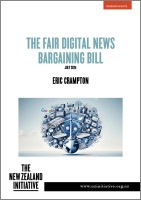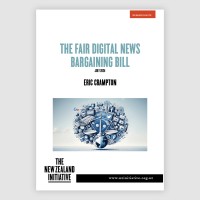
Don’t be squeamish about devolution – be Squamish
New Zealand has one of the world’s more centralised governments. Most taxation, regulation, and spending happen at the central government level. Read more

Eric Crampton is Chief Economist with the New Zealand Initiative.
He applies an economist’s lens to a broad range of policy areas, from devolution and housing policy to student loans and environmental policy. He served on Minister Twyford’s Urban Land Markets Research Group and on Minister Bishop’s Housing Economic Advisory Group.
Most recently, he has been looking at devolution to First Nations in Canada.
He is a regular columnist with Stuff and with Newsroom; his economic and policy commentary appears across most media outlets. He can also be found on Twitter at @ericcrampton.
Phone: +64 4 499 0790

New Zealand has one of the world’s more centralised governments. Most taxation, regulation, and spending happen at the central government level. Read more

Even if Labour had not banned offshore oil and gas exploration in 2018, it seems unlikely that exploration since then would have been delivering gas today. Gas reserves would have had to be discovered, then permits and equipment for drilling secured. Read more

Dr Eric Crampton sat down with Mark Leishman, Stephen Franks and Verity Johnson on RNZ's show The Panel. Eric discusses the results of a major three-year trial of Universal Basic Income (UBI) in the United States, exploring its effects on work, health, and well-being, while considering the broader implications and challenges of implementing such a system on a national scale. Read more

In 1968, ecologist Garrett Hardin argued that the “Tragedy of the Commons” is commonplace. If you wanted to deliberately engineer a commons problem, the management of the Conservation Estate would make for a pretty decent guidebook. Read more

It’s hard not to marvel at Silicon Valley’s technological innovations. But I’m dumbfounded by the social science experiment they’ve been working on. Read more

The government’s draft Emissions Budget gets a few important things right. It abandons measures like subsidies for electric vehicles that, perhaps counterintuitively, cannot reduce net national emissions. Read more

Wellington (Wednesday, 17 July 2024) - The New Zealand Initiative today welcomed the government’s intention, stated in the Draft Emissions Reduction Plan, to rely on the Emissions Trading Scheme to achieve the Zero Carbon Act’s goal of net zero emissions from 2050. But it also urged measures that would strengthen the ETS. Read more

Policy problems should be dealt with by the level and part of government best placed to deal with them. Good public policy should recognise subsidiarity. Read more

I wonder whether Media Minister Paul Goldsmith appreciates the problem that he has caused for the tech sector, for media companies, for himself, and for his government. Before the election, National Party spokesperson Melissa Lee condemned Labour’s Fair Digital News Bargaining Bill. Read more

Dr Eric Crampton talks to Sean Plunket on The Platform about the Fair Digital News Bargaining Bill. Watch below:
Read more

The New Zealand Initiative is urging the government to abandon the Fair Digital News Bargaining Bill, warning that the proposed legislation could harm the very news organisations it aims to help. In a new research note, the Initiative argues that the bill, which would require large digital platforms to negotiate payment for news content with New Zealand media companies, is based on flawed premises and risks significant unintended consequences. Read more

Wellington (Wednesday, 10 July 2024) - The New Zealand Initiative is urging the government to abandon the Fair Digital News Bargaining Bill, warning that the proposed legislation could harm the very news organisations it aims to help. In a new research note, the Initiative argues that the bill, which would require large digital platforms to negotiate payment for news content with New Zealand media companies, is based on flawed premises and risks significant unintended consequences. Read more

If philosophy students remember one thing from their lectures on Immanuel Kant in undergraduate classes, it is his categorical imperative. It’s easy to remember because it’s an awful lot like the old Christian ‘Golden Rule’. Read more
There’s a style of conference talk that I loathe. A self-described visionary will spend twenty minutes, or worse - even longer, stringing together clichés about how change is happening faster than ever before, how it will take soft skills to navigate it, and how we need to be ready. Read more
Sometimes, only truly committed localists can see the polished diamond hiding inside the very rough stone. We can remind ourselves that decades of poor incentives facing councils don’t build strong organisations. Read more